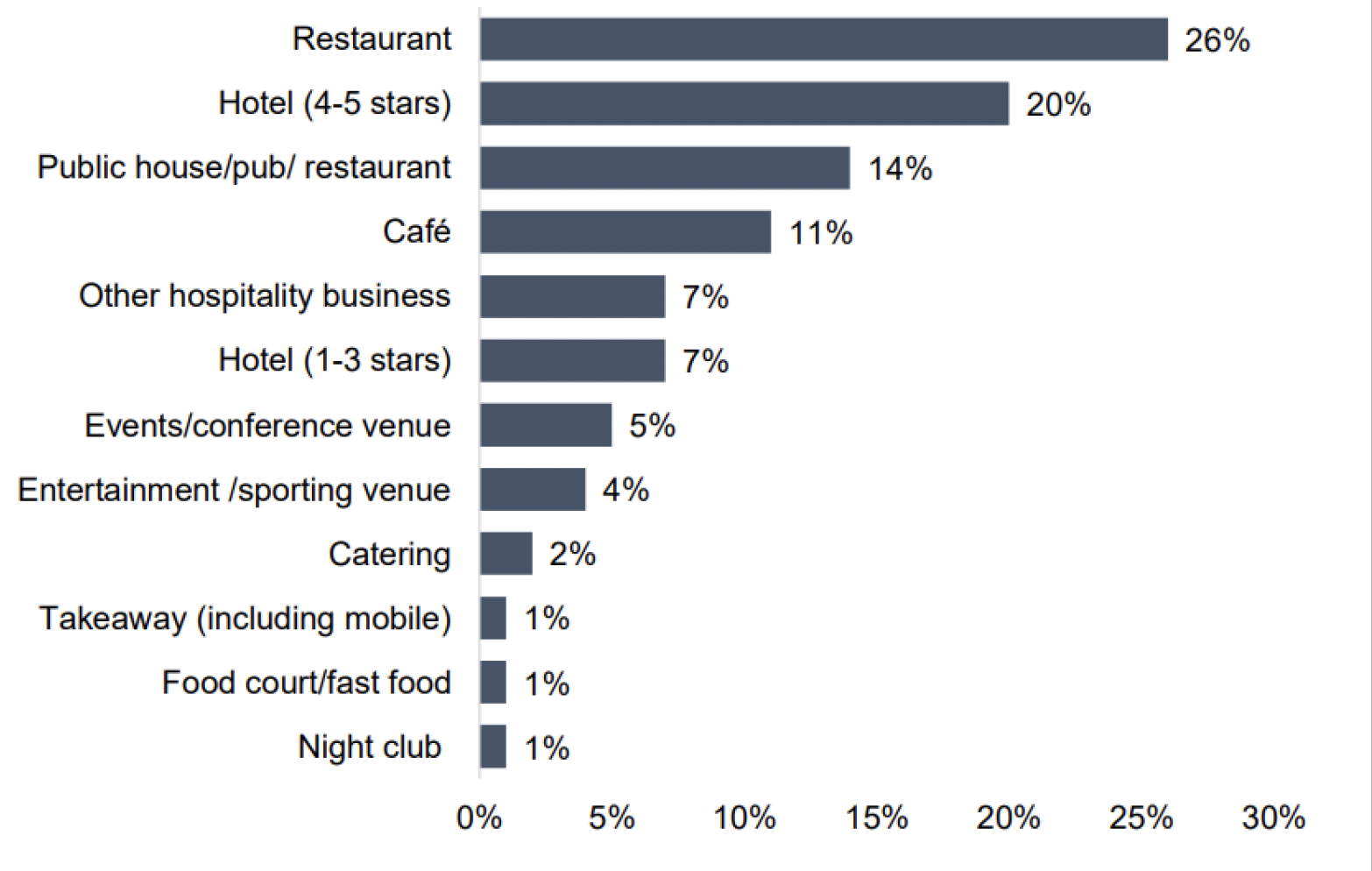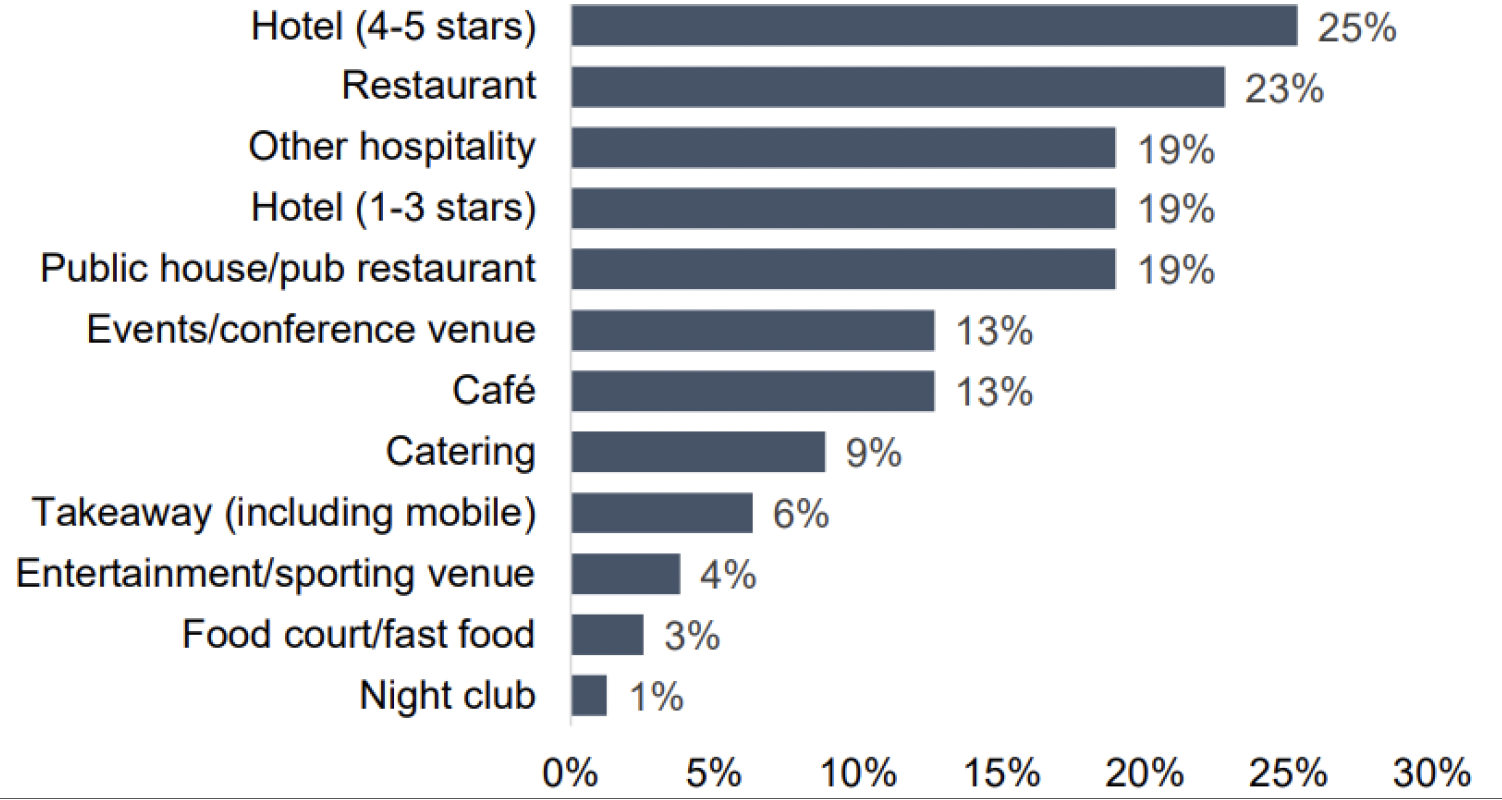Annex A – Research Methodology
Scope
The Inquiry aimed to consider practice in the following settings:
On-premises hospitality including:
- Hotels
- Restaurants (including fast food and chains)
- Cafés
- Bars
- Nightclubs
Off-premises food and drink including:
- Takeaway food
- Mobile food services
Secondary food and drink including:
- Food and drink operations within other businesses (e.g. supermarkets, casinos, bowling alleys, visitor attractions)
- Event catering, including sports and music
Inquiry sessions
The Hospitality Inquiry Group held themed sessions of the Inquiry to gather evidence on key issues and themes for the sector.
| Meeting | Detail | Date |
|---|---|---|
| 1 | Overview of fair work | 14 June 2022 |
| 2 | Precarious and problematic working practices | 14 September 2022 |
| 3 | Skills, training and professional development | 15 November 2022 |
| 4 | Equality, inclusion and diversity challenges | 21 February 2023 |
| 5 | Rurality and fair work | 18 April 2023 |
| 6 | Business challenges and impact on fair work | 13 June 2023 |
| 7 | Looking forward – long term aims in the hospitality sector | 12 September 2023 |
| 8 | Levers for change | 14 November 2023 |
| 9 | Recommendations / Agree Final Report | 19 March 2024 |
| 10 | 14 May 2024 |
The first meeting of the Inquiry considered a literature review exploring the challenges for fair work in the hospitality industry. Alongside this Scottish Government analysts produced a summary of key economic and statistical data to inform the Inquiry, looking at an overview of the hospitality sector in Scotland, as well as highlighting potential business challenges to advancing fair work in the sector.
Each thematic Inquiry meeting then considered an overview of evidence related to each of the themes set out above. This included consideration of an evidence paper, taking evidence from a range of invited speakers, outlined below, and drawing on the expertise and experience of the Inquiry group.
| Theme | Invited Speakers |
|---|---|
| Overview of fair work | The Office of the Chief Economic Adviser (OCEA) in the Scottish Government Professor Tom Baum, Strathclyde University Academic and Adviser to the Hospitality Inquiry |
| Precarious and problematic working practices | Jasmine Rostrom, National Economic Institute of Social Research Laura Robertson, Andy Sharp and Fiona McHardy, The Poverty Alliance ‘Serving the Future’ research Rob Watts and Helen Schwittay McArthur, Strathclyde University Bryan Simpson, Unite the Union Caitlin Lee, Hospitality Worker and Unite the Union Marc Crothall, Scottish Tourism Alliance |
| Skills, training and professional development | David Cochrane, HIT Scotland Inga McVicar, Springboard Professor Anna Leask, Edinburgh Napier University Jane Carr-Gomm, City of Glasgow College |
| Equality, inclusion and diversity challenges | Valerie Graham, Whitbread Janet Tidmarsh, Whitbread Lynn Campbell, Department of Work and Pensions (DWP) Paweł Kopeć, Citizens Rights Project |
| Rurality and fair work | Iain Jurgensen, Portavadie Resort Calum Ross, Loch Melfort Hotel Colin Morrison, Auchrannie Resort Sheena Borthwick, Barry Mochan and Tom Tracy, Arran Development Trust Audrey Maclennan, Highlands and Islands Enterprise Mark Rowley, South of Scotland Enterprise Jonny Inglis, Bethany Sharp, Roisin Curran and Laurence Kenney, Transport Scotland |
| Business challenges and impact on fair work | Duncan Stewart and Jim Eccleston, 56 Degree Insight Office of Chief Economic Advisor within the Scottish Government |
| Looking forward – long term aims in the hospitality sector | Josh Ryan-Saha, Traveltech for Scotland Laura Robertson and Chirsty McFadyen, Serving the Future Project |
| Levers for change | Professor Patricia Findlay, Strathclyde Business School Johanna McQuarrie, Strathclyde Business School |
To complement these sessions the following additional research work was undertaken:
A qualitative investigation into the experiences of workers in the hospitality sector in Scotland (Stockland et al, 2023) Qualitative research was conducted by the National Institute of Economic and Social Research (NIESR) in 2022, on behalf of the Fair Work Convention, to examine experiences of fair work in the hospitality industry in Scotland.
Fieldwork took place between May and July 2022 with 40 participants, consisting of semi-structured interviews with 30 hospitality workers and video diaries with 14 hospitality workers (four of whom were also interviewed).
FWC Survey of Hospitality Workers and Businesses (JRS, 2024) In December 2022, the Fair Work Convention commissioned the JRS Research Consortium to undertake two surveys - one with businesses, and one with workers. The research aimed to understand the experience of fair work for workers in the hospitality industry, and to explore hospitality businesses understanding of fair work, their sense of their own performance of fair work and the barriers they perceive to improving their fair work practice.
Survey fieldwork ran over a 9 week period from 3rd May - 9th July 2023. The survey was self-selecting, with participation promoted by the Fair Work Convention Hospitality Inquiry members (which includes STA, UK Hospitality, Scottish Pub and Beer association, Unite Hospitality and NUS Scotland). The survey was also promoted through a large number of other key organisations comprising individual businesses, colleges and universities, enterprise agencies and local authorities.
In total, 245 hospitality workers and 79 hospitality businesses took part in the surveys.
The survey sample profile is broadly representative in terms of percentage of women, non-UK nationals, ethnic minorities and rural residents. However, the survey under-represents workers aged 16 to 24 (21% of survey respondents vs 38% of total workers in sector) and zero hours contract workers (19% vs 28%) but over-represents people with a disability (32% vs 14%).
As shown in Figure 34, workers from a wide range of hospitality businesses participated in the survey. While the largest percentages worked for restaurants, hotels, pubs and cafés, workers from other types of business such as catering companies, takeaways and night clubs were also represented:

Base: All workers (n=245). Q2 Which of the following best represents the nature of the business where you work?
Comparing the worker survey sample profile with Scottish Government data on the profile of all employees working in hospitality in Scotland, Table 14 illustrates an under-representation in the survey of workers in certain types of business, most notably takeaways, while coverage of workers in other types of businesses was higher in the survey sample than in the industry as a whole, most notably hotels:
| Sector | Survey of workers sample profile | Proportion of hospitality employment* |
|---|---|---|
| Hotels | 27% | 24% |
| Restaurants and cafés | 37% | 38% |
| Takeaways | 1% | 11% |
| Catering/other hospitality | 18% | 10% |
| Pubs and bars | 14% | 14% |
| Licenced clubs | 1% | 2% |
Source: Business Register and Employment Survey 2022 for Employment *Proportions calculated using rounded data.
In terms of the sample profile of the 79 businesses who responded to the survey, as shown in Figure 35 there was a broad mix: 44% were hotels (including all star gradings), 23% were restaurants and 19% were pubs:

Base: All businesses (n=79). Multiple responses could be provided so results total more than 100%. Q1 Which of the following best represents the nature of your business?
Comparing the sample profile with data on the profile of all hospitality businesses in Scotland, Table 15 illustrates an under-representation of takeaways, while coverage of hotels was higher in the survey sample. The representation of other types of businesses in the survey largely reflected their proportions in the wider sector.
| Sector | Survey of businesses sample profile | Proportion of hospitality businesses in Scotland* |
|---|---|---|
| Hotels | 44% | 12% |
| Restaurants and cafés | 34% | 35% |
| Takeaways | 6% | 29% |
| Pubs and bars | 19% | 16% |
| Licenced clubs | 1% | 3% |
Source: ONS Businesses – Inter-Departmental Business Register 2023
Full details of the sample profiles and methodology can be found in the full report.
Fair work policy levers in Scotland
Levers for fair work in Scotland (Findlay et al, 2024) In November 2022, the Fair Work Convention commissioned the Scottish Centre for Employment Research (SCER) at the University of Strathclyde to conduct a two-part study exploring possible new or adapted policy levers to improve fair work in Scotland (part 1), as well as potential policy levers specifically for the hospitality industry (part 2).
SCER’s research to inform part 1 of the study was desk-based and involved a rapid evidence assessment of academic and non-academic peer-reviewed articles, policy and research reports and evaluations, and working papers. The rapid evidence assessment had two aims, firstly to identify and review existing knowledge on policy levers and how these are applied in advancing fair work, and secondly, to evaluate any evidence on the effectiveness of levers in generating their intended outcomes.
Levers for fair work in hospitality in Scotland
Levers for fair work in hospitality in Scotland (Findlay et al, 2024) SCER carried out research to inform part 2 of the study involving in-depth interviews with 15 stakeholders spanning 11 hospitality organisations, which took place over Autumn 2023. The part 2 report considers a range of policy levers available to the Scottish Government and how these may be received among hospitality industry stakeholders.
Evidence sessions with workers and employers
Qualitative evidence sessions were carried out by the Fair Work Convention Secretariat with workers and employers throughout the Inquiry period, to provide an in-depth understanding into experiences of fair work in the hospitality industry. These included:
- Evidence sessions with hospitality employers, workers and other organisations at Hospitality Inquiry meetings
- 3 evidence sessions with businesses (1 of 3 with rural businesses)
- 5 evidence sessions with workers (2 of 5 with migrant workers)
Evidence sessions were held online and facilitated by the Fair Work Convention Secretariat, with support from translators and the Citizens Advice Project where required (e.g. for sessions with migrant workers).
Qualitative analysis was undertaken on evidence from sessions, with recurring issues and key themes identified between groups. Verbatim quotes and reflections from the evidence sessions have been used throughout the report to illustrate key points – the use of quotes does not infer any weight of response by the participant, rather they are used to illustrate a point.
Case studies
Case studies from across the hospitality industry in Scotland were gathered to highlight good practice and examples of fair work being delivered in the sector, and are included throughout this report. Organisations and businesses were identified through Hospitality Inquiry Group Members, the Fair Work Convention, and their wider networks, with specific examples highlighted for potential inclusion as a case study.
In most cases, case study interviews were carried out with a representative from the organisation to inform the case study. Interviews took place online and in-person between February and June 2024, and lasted 60 minutes. Where information could be collected effectively through desk-based research and online sources, it was deemed that an interview wasn’t required and the case study was drafted and then reviewed by an organisation/business representative.
The case studies included in this Inquiry report are not representative of all good practice that is currently taking place across the hospitality sector. Rather, they highlight some examples of fair work being delivered against each dimension of the Fair Work Framework.